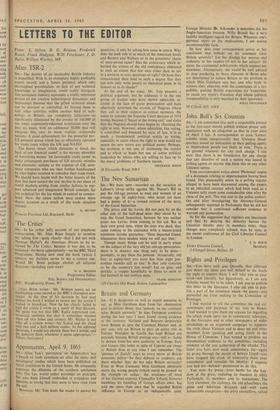Appomattox, April 9, 1865
Slit,—Allen Tate's 'peroration' on Appomattox was a breath bf fresh mountain air after the many dull sociological studies which have been published on racial conditions in the United States. He eloquently expresses the dilemma of the southern gentleman like Lee, would rather surrender on principle, but who finds himself embroiled in prejudices and Passions so strong that they seem to have risen from the soil.
However, Mr. Tate leads the reader to answer his questions, if only by asking him some in return. Why does the mob rule in so much of the American South and Barnett and Wallace sit in the governors' chairs of once proud states? Has the aristocracy which in- herited the virtues of the old confederacy abdicated to such an extent that few men either dare or are in a position to raise questions of right? Or have they romanticised their land to such a degree that they Can now only write poetry or rhetorical prose in its honour or to its shame?
At the end of his essay, Mr. Tate presents a political argument, but he addresses it to the one group of leaders who have shown admirable re- straint in the face of grave provocation and have effectively governed the crowds of Negroes whom they call to their support at critical moments. He seems to consider the Supreme Court decision of 1954 wrong, because it 'began at the wrong end,' and states that the Negroes should have begun by obtaining the right to vote. However, where education, like voting, is controlled and financed by state of law, it is as much a fundamental political reality as voting, especially in states where the right to vote would not insure the new voters any political power. Perhaps, the problem is not one of estimating the correct end at which to begin but one of active political leadership by whites who arc willing to face up to the moral problems of Southern racism.
36 Elsworthy Road, NW3
FREDERICK ROSEN






























 Previous page
Previous page